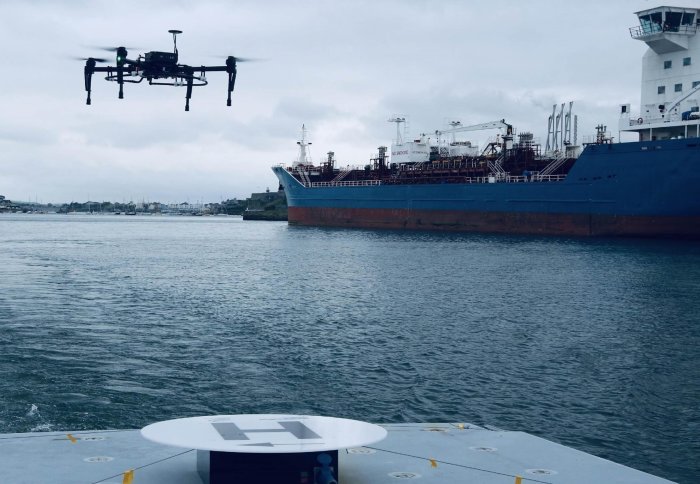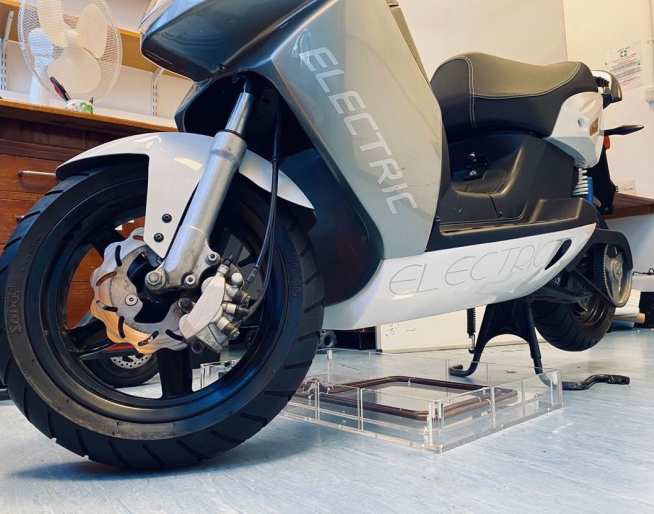Startup profile: Bumblebee Power - developing efficient wireless charging
by Gavin Reed

Bumblebee has developed a prototype for wireless charging of reconnaissance drones with Thales
Bumblebee Power’s technology enables efficient wireless power transfer for e-bikes, electric scooters, drones and more.
A team of Imperial academics from the Department of Electrical and Electronic Engineering has founded Bumblebee Power, a wireless power solution born out of research in Imperial’s Wireless Power Lab. The team, led by Dr David Yates, Zac Hinton and Professor Paul Mitcheson, has carried out extensive technology development and made excellent progress with industry partners to take their technology into the marketplace.
The problem
In response to growing concerns over air pollution and congestion, increasing difficulty in extracting fossil fuels and myriad other factors, the world is experiencing a proliferation in the use of electric vehicles and systems of all types: from drones to delivery vehicles, from automated factories to leisure and commuter cycles and scooters.
This rapidly growing market – predicted to exceed $245 billion by 2030 – relies heavily on battery-swapping and cable-based charging, which dramatically limits the utility of electric vehicles and systems. Wireless power technologies can provide a solution, but existing technologies require very precise positioning and use expensive, heavy materials.
Bumblebee Power has developed wireless charging technology which:
- Offers three times the wireless range
- Has three times the tolerance to misalignment
- Weighs less than 10% of current solutions
Bumblebee Power’s approach
Bumblebee’s first target industry is urban e-bike hire schemes, for which it will provide wireless charging solutions. The shared electric micro-mobility market is forecast to spend more than £140bn on battery charging by 2030. Bumblebee Power’s wireless charging solution offers a 50% cost saving for e-bike hire schemes alongside substantial convenience benefits.
It plans to extend its technology offering in future to a range of other markets including autonomous systems, drones and factory automation. These charging solutions can be provided OEM or as retrofit kits.
“Bumblebee provides the only wireless charging solution that delivers the lightweight, mid-power and freedom of position performance that users really want. Bumblebee will transform wireless charging from a nice-to-have to a must-have technology across multiple markets.” – Dr David Yates
Bumblebee’s journey so far
The company has raised £5 million in funding to develop the underlying technology alongside a £200,000 in Impact Acceleration grant funding that has allowed it to develop scooter and drone-charging prototypes. A further £80,000 of grant funding enables it run trials for e-bike charging, opening up a route to market.

Beyond its focus on the fundamental technology, Bumblebee has made excellent progress with potential industry partners. It has developed working prototypes for an e-scooter charging solution with Govecs and a reconnaissance drone charging pad for Thales’ autonomous surface vessel. Bumblebee is working with companies such as Deliveroo and Elmovo to support the transition to e-scooter use for delivery riders.
Bumblebee is also collaborating with UK bicycle manufacturer, Pashley Cycles, to roll out wireless charging bays for use in e-bike hire schemes across the UK and beyond.
“Bumblebee has made extensive progress in the area of wireless charging for shared electric micro-mobility, with established customer demand and an exciting value proposition. We are planning initial trials in early 2021 in urban e-bikes with expected widespread deployment to follow soon after.” – Zac Hinton
Bumblebee Power and Imperial
Bumblebee’s founders have developed a wealth of technical expertise in their work at Imperial, especially through the Wireless Power Lab in the Department of Electrical and Electronic Engineering.
Bumblebee founder David Yates developed key customer relations with Deliveroo, Elmovo, Pashley, Govecs and Thales through Imperial’s Techcelerate program.
“Bumblebee has benefited from Imperial’s extensive ecosystem for supporting entrepreneurship and university startups all the way from initial IP protection, to funding accelerator programs, and providing business advice. ”- Professor Paul Mitcheson
Brijesh Roy, Seed Investment Manager at Imperial says Bumblebee Power provides a standout example of an academic startup company leveraging research expertise and funding and applying that to find a solution to a real-world problem: “The team behind Bumblebee Power has taken a real customer-focused approach to developing their technology. At every stage they have engaged with real-world users to make sure that their ground-breaking technical achievements are truly relevant to industry. This approach is central to Imperial’s founding mission, and I look forward to seeing what Bumblebee achieves in the coming years.”
Engaging with the Imperial startup ecosystem
The Imperial startup ecosystem generates a diverse range of companies each year, with founders including students, researchers, alumni – and often a combination of all three.
To find out how you can engage with our startups, contact the Startup Team.
Businesses in all sectors can find out more about the ways they can benefit from Imperial’s expertise, resources and talent by visiting the Enterprise Division’s web pages, where they can learn about opportunities to engage and join the mailing list.
Academics interested in working with industry can also find out about increasing the impact of their research, through routes including research partnerships, commercialisation and consultancy from the Enterprise Division's staff home page.
Article text (excluding photos or graphics) © Imperial College London.
Photos and graphics subject to third party copyright used with permission or © Imperial College London.
Reporter
Gavin Reed
Enterprise